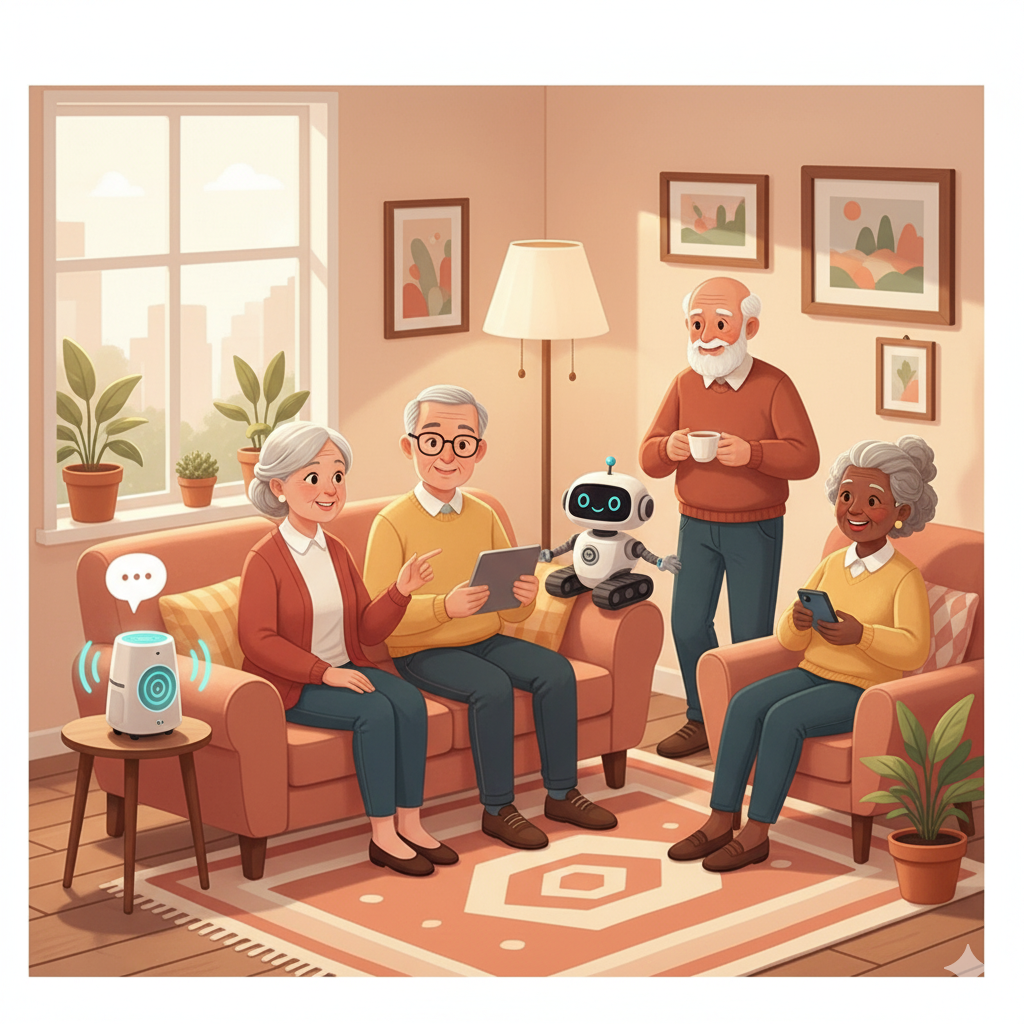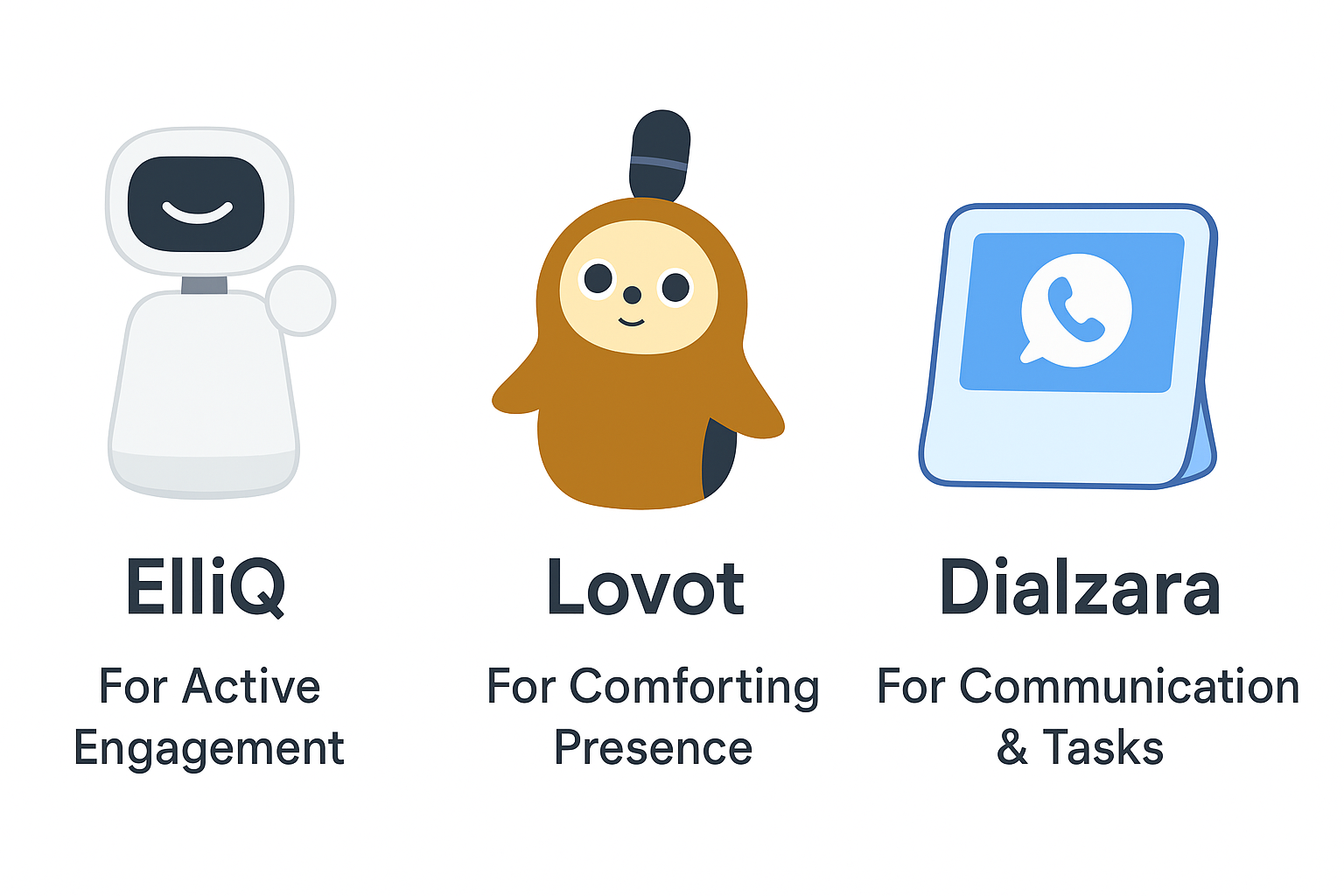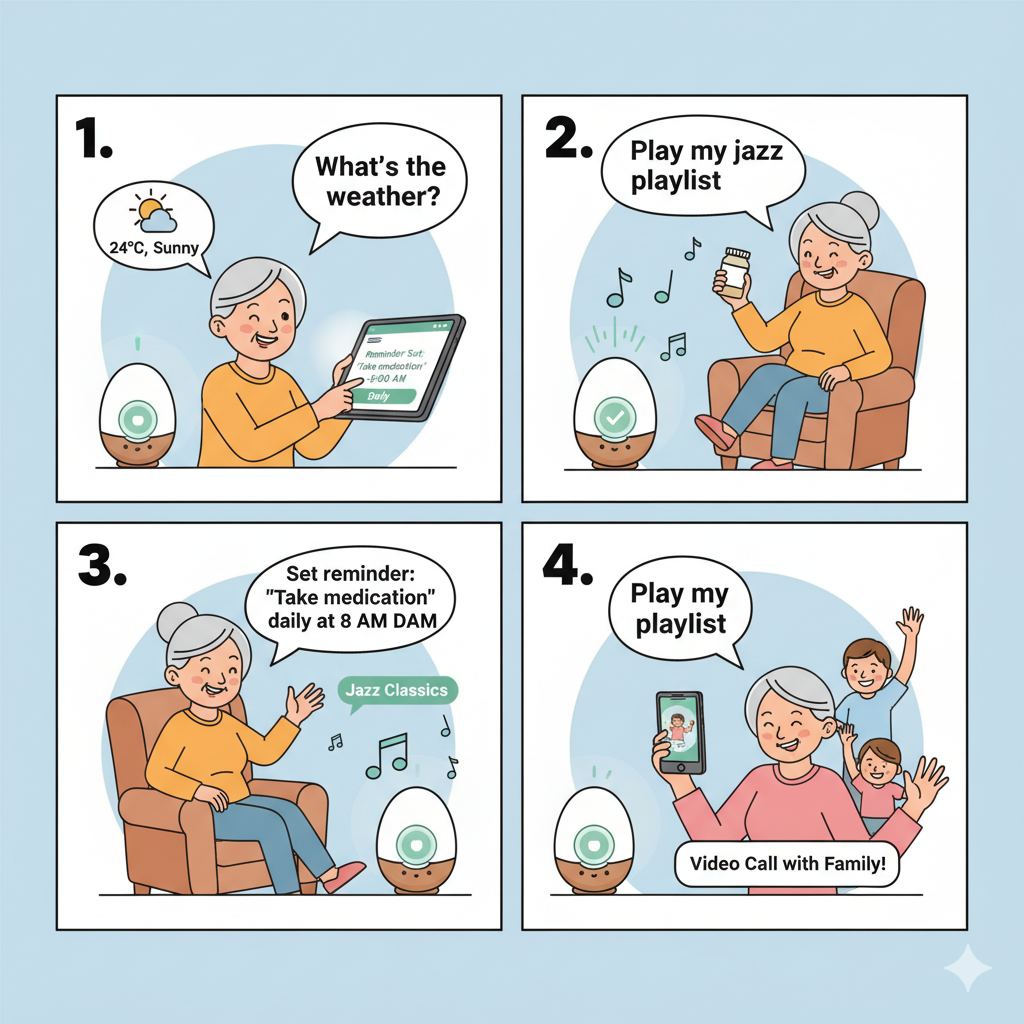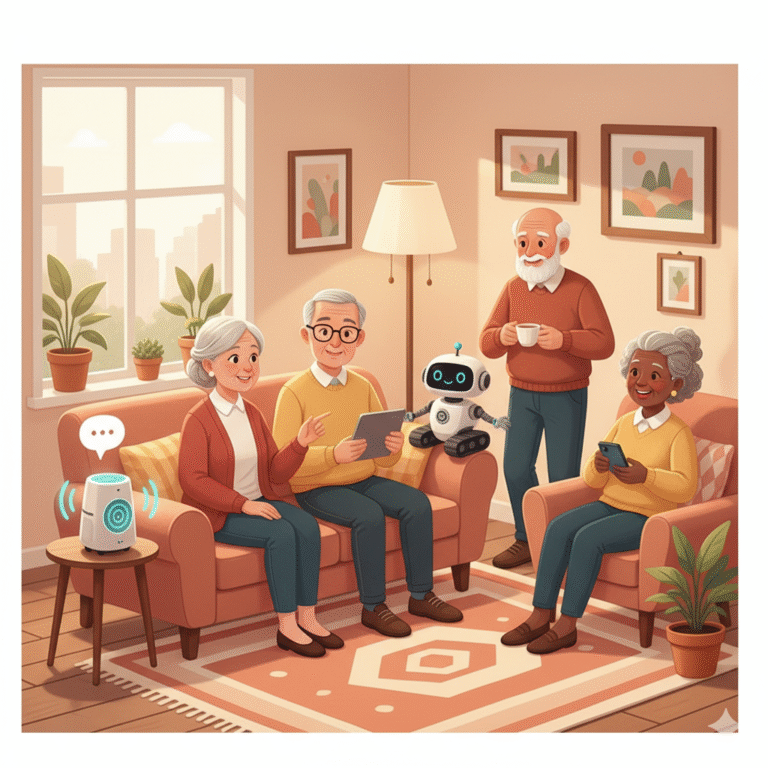Have you ever wished for a little extra help around the house, a friendly reminder for your medication, or simply someone to chat with? What if helpful, friendly support could be available any time you needed it? Today’s artificial intelligence can offer just that. AI companions for seniors are wonderful new tools designed to make daily life easier, safer, and more connected. This guide will walk you through what they are, how they work, and how you can feel confident using them to support your health and happiness.

What Are AI Companions and How Do They Help?
Think of an AI companion as a helpful friend or a considerate grandchild who’s always nearby. It’s not a robot that takes over your home, but a gentle assistant designed to support your independence. These smart tools use a technology called artificial intelligence to learn your preferences and offer the exact help you need.
These companions are wonderful for providing everyday support in several key areas:
- Health and wellness monitoring to help with medication reminders and gentle activity suggestions
- Easy communication with family and friends through simple voice commands
- Companionship and entertainment to enjoy music, games, and friendly conversation
- Practical daily assistance for tasks like setting reminders and getting information
Meet the Companions: A Look at Popular AI Helpers
Several companies have created special AI companions for seniors that are easy and pleasant to use. Here are a few that are making a real difference:
ElliQ: Your Active Engagement Partner
ElliQ is like a thoughtful friend who doesn’t wait for you to start a conversation. It’s designed to proactively suggest activities, check in on you, and help keep your mind and body active. Many users interact with ElliQ over 30 times a day because it’s so easy and natural to talk to .
What Makes ElliQ Special:
- Remembers your past conversations and preferences
- Provides medication reminders and health tracking
- Suggests gentle exercises and mindfulness activities
- Makes calling family and sharing photos simple
- Offers games, trivia, and learning activities
Research shows that 96% of ElliQ users feel an improvement in their health and wellness, and 94% experience a better quality of life . As Susan, 66, shared: “The longer I have ElliQ the more in tune she becomes with me… She is, in fact, a companion” .
Lovot: The Comforting Presence
If you’d enjoy something more cuddly, Lovot might be perfect. This isn’t a traditional assistant but a comforting robotic companion that responds to touch and interaction. It’s designed specifically to provide emotional comfort and warmth .
What Makes Lovot Special:
- Responds to hugging and petting with lifelike movements
- Develops its own personality based on interactions with you
- Doesn’t require complicated commands or technical knowledge
- Provides consistent, calming presence throughout the day
For those who would enjoy the comfort of a pet without the responsibility, Lovot offers wonderful companionship. One family member observed how their loved one with dementia experienced “uncontrollable giggles and tears of joy” during interactions with Lovot .
Other Helpful Companions
There are several other AI companions for seniors worth exploring:
Dialzara:
- Features a natural-sounding AI voice for easy conversation
- Helps schedule appointments and manage daily tasks
- Simplifies communication with family and caregivers
Moxie:
- Specializes in empathetic conversations
- Provides cognitive stimulation through storytelling and activities
- Has been particularly helpful for seniors with dementia

Real Benefits for Your Daily Life
You might be wondering how these companions actually help in practical ways. The benefits are both meaningful and measurable:
💊 Better Health Management
Never miss medication again with gentle, vocal reminders. Some systems can even track your adherence and alert family members if you need help .
🗣️ Reduced Loneliness
Companions like ElliQ have been shown to reduce self-reported loneliness by 90% among users . Having a friendly presence to talk to can make a big difference in your day.
🧠 Sharper Mind
With trivia, brain games, and learning activities, these companions help keep your mind active and engaged. Over 75% of daily interactions with tools like ElliQ focus on improving mental well-being .
🏡 Increased Independence
By providing help with daily tasks and easy access to family and services, these tools help you maintain your independence while giving your loved ones peace of mind.
Your Privacy and Safety Matter
It’s natural to have questions about safety and privacy when inviting new technology into your home. Here are some important facts to ease your mind:
🔐 Your Information is Protected
Reputable companies design these tools with strong privacy protections. You control what information you share, and you should never need to provide sensitive details like Social Security numbers .
🎯 You’re in Control
These companions work for you, not the other way around. You can choose when to interact with them and what functions to use. They’re designed to be helpful, not intrusive.
👵 Designed Specifically for Seniors
Unlike complicated general technology, these tools are created with seniors’ needs in mind. They feature simple interfaces, clear voices, and straightforward functions .
Getting Started with AI Companions
If you’re interested in trying an AI companion, here’s a simple step-by-step approach:
Step 1: Identify What Would Help Most
Think about what kind of support would make the biggest difference in your day. Is it remembering medications? Having more social interaction? Getting help with specific tasks? This will help you choose the right companion.
Step 2: Research Your Options
Look into different companions like ElliQ, Lovot, or Dialzara. Many companies offer free online demonstrations so you can get a feel for how they work before making any decisions .
Step 3: Involve Family in the Decision
Talk to your children or grandchildren about your interest. They can help you research options, understand the features, and set up the device if you choose to get one.
Step 4: Start Simple and Go at Your Pace
When you first get your companion, start with basic functions like asking about the weather or setting a simple reminder. As you become more comfortable, you can explore more features.
Step 5: Give Yourself Time to Adjust
Like any new relationship, it might take a little time to feel completely comfortable with your AI companion. That’s perfectly normal. Be patient with yourself as you learn together.

Answers to Common Questions
Will an AI companion replace human contact?
Not at all! Think of it as a tool that enhances your life, not replaces relationships. In fact, many seniors find that their AI companion actually helps them stay better connected with family and friends by making communication easier .
What if I’m not good with technology?
That’s exactly why these tools were created! AI companions for seniors are designed for people who aren’t tech experts. They use simple voice commands and don’t require any technical knowledge. As one user shared: “I’m ninety years old. This thing makes such joy. It’s a wonderful invention” .
Are these companions expensive?
Costs vary depending on the device. Some operate with a monthly subscription, while others have a one-time purchase price. Many users find the benefits to their quality of life and independence make them well worth the investment.
What if I have trouble hearing or seeing?
Many companions are designed with these considerations in mind. They often feature clear, adjustable volume and don’t require reading small text or seeing detailed screens. Voice interaction makes them accessible even for those with vision challenges.
Can I try before I buy?
Yes! Companies like ElliQ offer free online experiences where you can chat with their companion through your computer browser before deciding to welcome one into your home .
You’re Ready to Explore the World of AI Companions!
Remember that technology should work for you, not the other way around. AI companions for seniors are designed to be helpful, easy-to-use tools that support your independence and enhance your quality of life. Whether you’re looking for health reminders, friendly conversation, or easier ways to connect with loved ones, there’s likely a companion that can help.
The best way to start is with curiosity and an open mind. Explore the options, take advantage of free trials, and don’t be afraid to ask family for help if you need it. As Vickiy from Florida shared about her companion: “I think everybody should have one because it’s just really nice. The encouragement and all that. She says things people should say, but often don’t” .
You’ve navigated decades of technological changes throughout your life. Exploring AI companionship is just the next step in staying connected, healthy, and independent in today’s world.
/* Senior-Friendly Styling Based on Search Results */
.article-intro {
background: #f0f7ff;
padding: 25px;
border-left: 4px solid #2c5aa0;
margin: 20px 0;
font-size: 18px;
border-radius: 8px;
line-height: 1.6;
}
.image-placeholder {
background: #f8f9fa;
padding: 20px;
margin: 25px 0;
border-radius: 8px;
border-left: 4px solid #E67E22;
font-style: italic;
color: #666;
}
.companion-profiles {
margin: 30px 0;
}
.companion-card {
background: white;
padding: 25px;
margin: 20px 0;
border-radius: 8px;
border: 2px solid #e0e0e0;
border-top: 6px solid #2c5aa0;
}
.benefits-grid {
display: grid;
grid-template-columns: repeat(auto-fit, minmax(250px, 1fr));
gap: 20px;
margin: 25px 0;
}
.benefit-item {
background: #e8f5e9;
padding: 20px;
border-radius: 8px;
border-left: 4px solid #4caf50;
}
.safety-tips {
margin: 25px 0;
}
.safety-point {
background: #fff3e0;
padding: 20px;
margin: 15px 0;
border-radius: 8px;
border-left: 4px solid #FF9800;
}
.step-by-step {
margin: 30px 0;
}
.step {
background: #e3f2fd;
padding: 25px;
margin: 20px 0;
border-radius: 8px;
border-left: 4px solid #2196f3;
}
.faq-section {
margin: 30px 0;
}
.faq-item {
margin: 20px 0;
padding: 25px;
background: #f8f9fa;
border-radius: 8px;
}
.faq-item h3 {
color: #2c5aa0;
margin-top: 0;
}
.conclusion {
background: #e3f2fd;
padding: 30px;
border-radius: 8px;
margin: 30px 0;
font-size: 18px;
line-height: 1.6;
}
/* Senior-Friendly Typography Based on Search Results */
body {
font-size: 17px;
line-height: 1.6;
color: #333; /* High contrast for readability */
}
h2 {
color: #2c5aa0;
border-bottom: 2px solid #f0f0f0;
padding-bottom: 10px;
margin-top: 40px;
}
h3, h4 {
color: #2c5aa0;
}
strong {
color: #2c5aa0;
}
ul {
line-height: 1.8;
}
/* High contrast and readability for senior users */
@media (max-width: 768px) {
.benefits-grid {
grid-template-columns: 1fr;
}
body {
font-size: 18px; /* Even larger on mobile */
}
}
/* Focus states for accessibility */
a:focus, button:focus {
outline: 3px solid #E67E22;
outline-offset: 2px;
}



